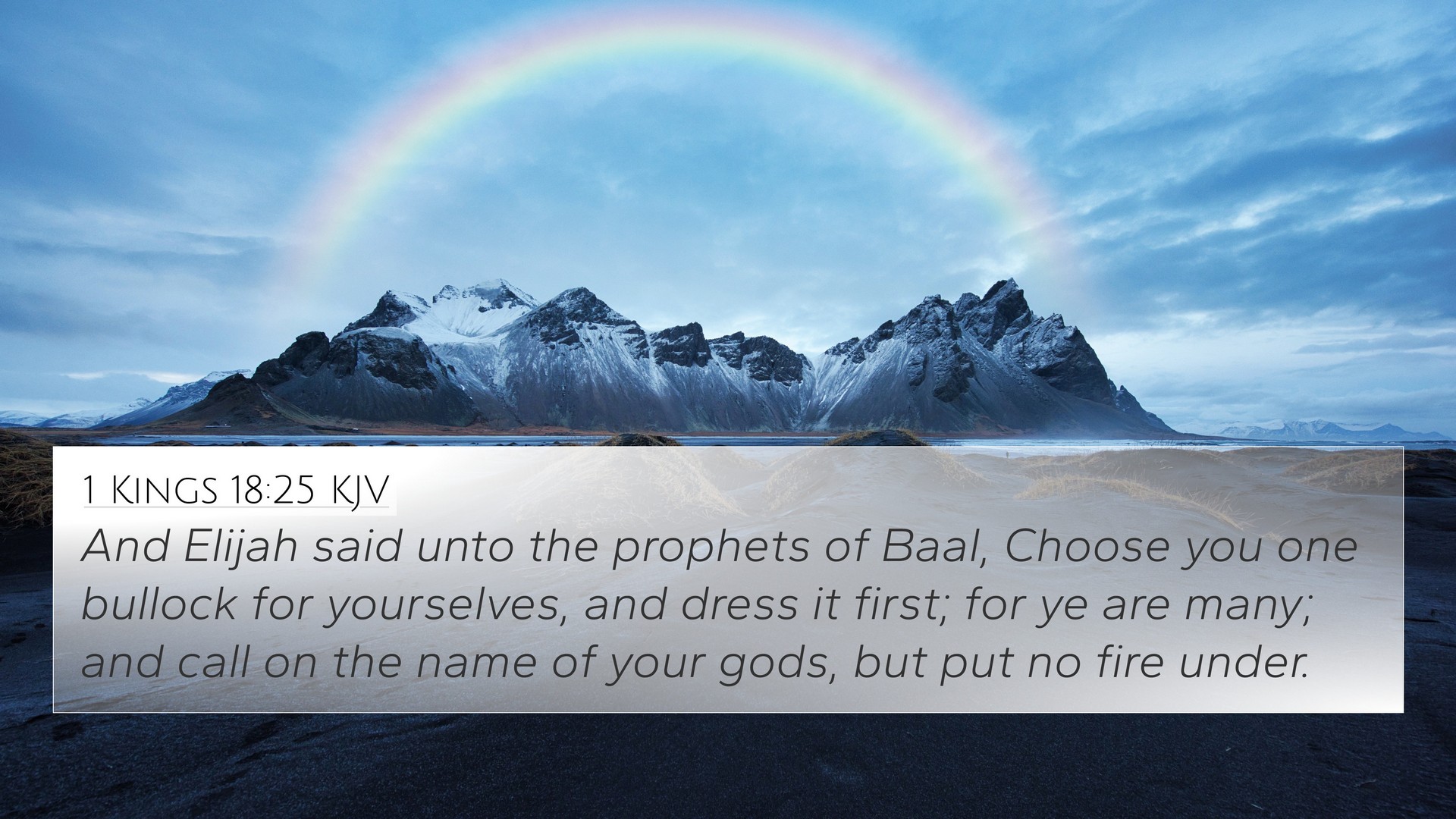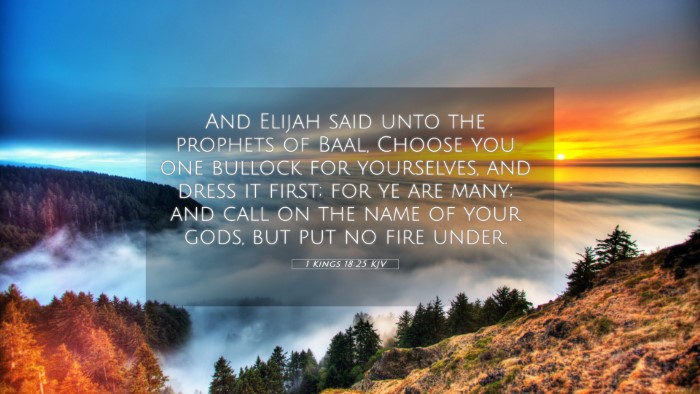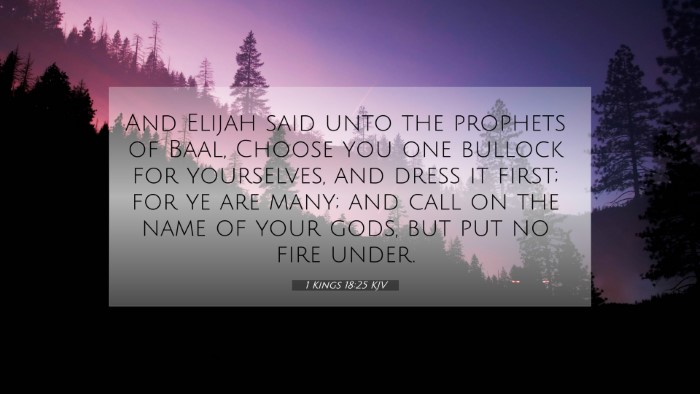Understanding 1 Kings 18:25
Bible Verse: 1 Kings 18:25
Verse: "And Elijah said unto the prophets of Baal, Choose you one bullock for yourselves, and dress it first; for ye are many; and call on the name of your gods, but put no fire under." (1 Kings 18:25)
Verse Context
This verse occurs in the context of Elijah's confrontation with the prophets of Baal on Mount Carmel. The entire chapter is centered around the challenge to demonstrate the true God through a contest between Elijah and the 450 prophets of Baal, which highlights God’s sovereignty and power.
Analysis of the Verse
The following insights combine the perspectives of renowned public domain commentaries:
- Matthew Henry: Describes Elijah's challenge to the prophets of Baal as a pivotal moment that exposes the impotence of idol worship. By allowing them to go first, Elijah demonstrates confidence in the living God, and the absurdity of their false gods is revealed through their frantic attempts to conjure fire.
- Albert Barnes: Emphasizes the strategic nature of Elijah's challenge. By choosing a bullock and asking the prophets to prepare it first, Elijah sets the stage for a clear demonstration of Yahweh's ultimate power. This moment serves as a critical comparison of the true God versus Baal, establishing a classic narrative of faith versus falsehood.
- Adam Clarke: Points to the significance of the rituals performed by the prophets of Baal, indicating their desperate nature and the futility of their prayers. Clarke underscores the importance of faithfulness to God, contrasting the passionate but misguided worship of Baal’s prophets with Elijah’s straightforward trust in God’s power.
Thematic Connections
Elijah's bold action and challenge against the prophets of Baal can be understood through various thematic connections with other scriptures:
- Exodus 20:3-5: The commandment against idolatry reinforces the underlying message of 1 Kings 18, highlighting God's demand for exclusive worship.
- 1 Samuel 15:23: The comparison between rebellion and witchcraft connects to Baal worship, advocating for obedience to God versus idolatrous practices.
- Hebrews 12:1-2: The call to fix eyes on Jesus parallels Elijah's focus on God's power, showcasing the essential faith that leads to victorious outcomes.
- Matthew 16:18: “The gates of hell shall not prevail” can be related to Elijah's victory over Baal, emphasizing that God will triumph over all false prophets and gods.
- Romans 12:1: The appeal to present our bodies as living sacrifices resonates with Elijah's offering, reinforcing the idea of genuine worship and sacrifice to the Living God.
- James 5:17-18: Reference to Elijah as a man of like nature signifies the power of prayer and faith in God to alter circumstances, linking back to the fiery contest on Mount Carmel.
- Revelation 19:20: The ultimate defeat of the false prophets in the end times underscores the futility of idolatry, further illustrating the themes found in 1 Kings 18.
Cross-Referencing Biblical Texts
Using tools for Bible cross-referencing provides deeper insight into the significance of the events at Mount Carmel. Here are some cross-references that are meaningful when studying this verse:
- 1 Kings 18:20-24: The setup of the challenge and the rituals of the prophets of Baal lay the groundwork for understanding the tension in this verse.
- 2 Chronicles 18:31-34: Acknowledges the danger posed by false prophets, paralleling the challenge of Baal worshippers in Elijah's time.
- 1 Thessalonians 1:9: The turning from idols to serve the living God echoes the confrontation Elijah has against Baal.
- Galatians 4:8: Discusses knowing God and turning back to weak and beggarly elements, similar to the folly of Baal worship.
- Matthew 6:24: The impossibility of serving two masters resonates with the conflict between Yahweh and Baal.
- Mark 12:29-30: Jesus affirms the greatest commandment to love God, aligning with Elijah’s challenge regarding the true allegiance of the people.
- Acts 19:26: Highlights the economic and spiritual implications of turning from idol worship, similar to those seen in the confrontation at Carmel.
Tools for Bible Cross-Referencing
Understanding connections between Bible verses can be enhanced with various tools and methods:
- Bible Concordance: A vital resource for finding original Hebrew or Greek words related to themes in 1 Kings 18:25.
- Bible Cross-Reference Guide: Helps users navigate through similar themes across both the Old and New Testament.
- Cross-Reference Bible Study Methods: Employing various methods and methodologies can uncover thematic similarities and contrasts.
- Bible Chain References: These are useful for linking key verses that reinforce the messages found in 1 Kings 18.
- Comprehensive Bible Cross-Reference Materials: Such resources enhance understanding of the intricate web of Biblical themes, providing deeper insights.
Conclusion
The verse 1 Kings 18:25 beckons believers to engage in deeper study of the Bible through cross-referencing. The insights highlighted by Matthew Henry, Albert Barnes, and Adam Clarke reveal the profound implications of Elijah's challenge to the prophets of Baal. By using various verses as reference points, we strengthen our interpretation and appreciation of Biblical texts.
Cross-referencing Biblical texts provides not just a layer of understanding but emboldens believers to grasp the recurring themes of idolatry, false worship, and the ultimate sovereignty of God throughout scripture.


